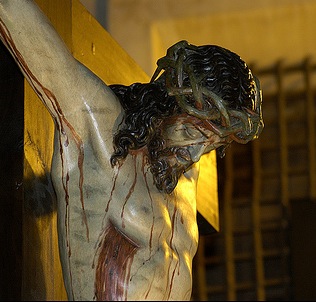To Thee Belong Mercy and Forgiveness

Monday Within the Second Week of Lent
Daniel 9:4-10
Luke 6: 36-38
I Set My Face to the Lord
I don’t know why the editors of the Lectionary did not begin today’s First Reading with Daniel 9, verse 3. In few words it sets the tone for the magnificent act of contrition that follows. The missing verse is this: “And I set my face to the Lord my God to pray and make supplication with fasting, and sackcloth, and ashes” (Dn 9:3).
Only then does the prophet Daniel give us the fruit of his compunction: a prayer of confession and an act of contrition.
Compunction
What is compunction? It is the cutting awareness of our sins. Compunction is not something that we can produce in ourselves and of ourselves. Compunction is a grace: it is a fruit of the combined action of the Word of God and of the Holy Ghost within the soul.
Sword and Fire
What do we read in the Letter to the Hebrews? “The Word of God is living and effectual, and more piercing than any two edged sword” (Hb 4:12), and in another place, “Our God is a consuming fire” (Hb 12:29). It is a perilous thing to expose oneself to the Word of God because one risks being pierced through and purified by fire. This is why so many people turn a deaf ear to the Word, or hide from it, or say, “Ah, this is not meant for me, but it perfectly suits so and so. It is just what he (or she) needs to hear.”
Compunction, Confession, Contrition
One who, on the other hand, actively seeks the grace of compunction by hearing the Word of God and invoking the fire of the Holy Spirit, will be compelled to confess his sins and to express real sorrow for them.
Forgiveness and Detachment
That being said, all our confessions and acts of contrition can be rendered fruitless — utterly sterile — if we are without mercy toward others, if we judge, or if we condemn. True compunction softens the heart. Compunction makes one quick to forgive. It makes us detached from self-will, from seeking our creature comforts, and from being avaricious of our time. This three-fold detachment renders us capable of acts of generosity: generosity first towards God, and then, towards our neighbour.
Generosity
Generosity is a sure sign of God’s grace. Legalism (conforming merely to the letter of the law), minimalism (doing merely what is required), stinginess and greed are infallible indicators of a deficit of Divine Grace. It is a good rule always to go beyond what is asked or required. Bishop Fulton J. Sheen used to say, “If you have difficulty spending one hour before the Blessed Sacrament, spend two.” Our Lord says, “If a man take away thy coat, let go thy cloak also unto him” (Mt 5:40).
An Immeasurable Mercy
To sum up: compunction, confession and contrition lead to a readiness to show mercy, to the refusal to judge and to condemn and, finally, to generosity. “The measure you give will be the measure you get back.” A measured mercy is no mercy at all.

It is so good to have you back, Father Mark. I always find something useful in your thoughtful, prayerful, informative, and challenging posts. Thank you.
Please pray for me, a sinner.
Yes, this was a very good homily; one that stayed me the whole day. You are correct, compunction is not often mentioned in homilies today nor in spiritual conversation but very much needed.
Again, I’m very grateful for these posts. Thank you, and God bless you. I will keep you in my prayers, Father.